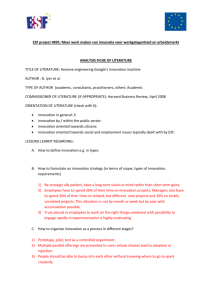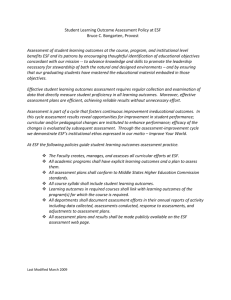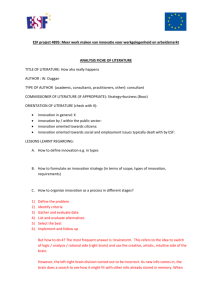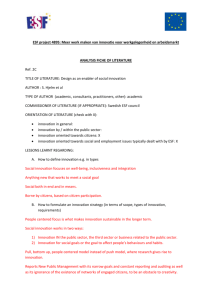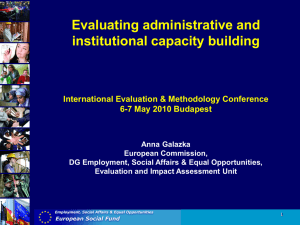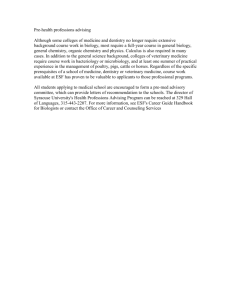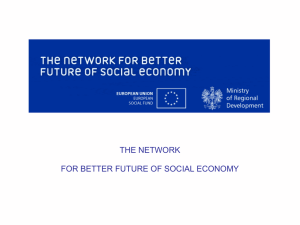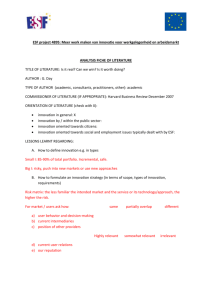January 2012 Overview of Bilateral Free Trade Agreement
advertisement
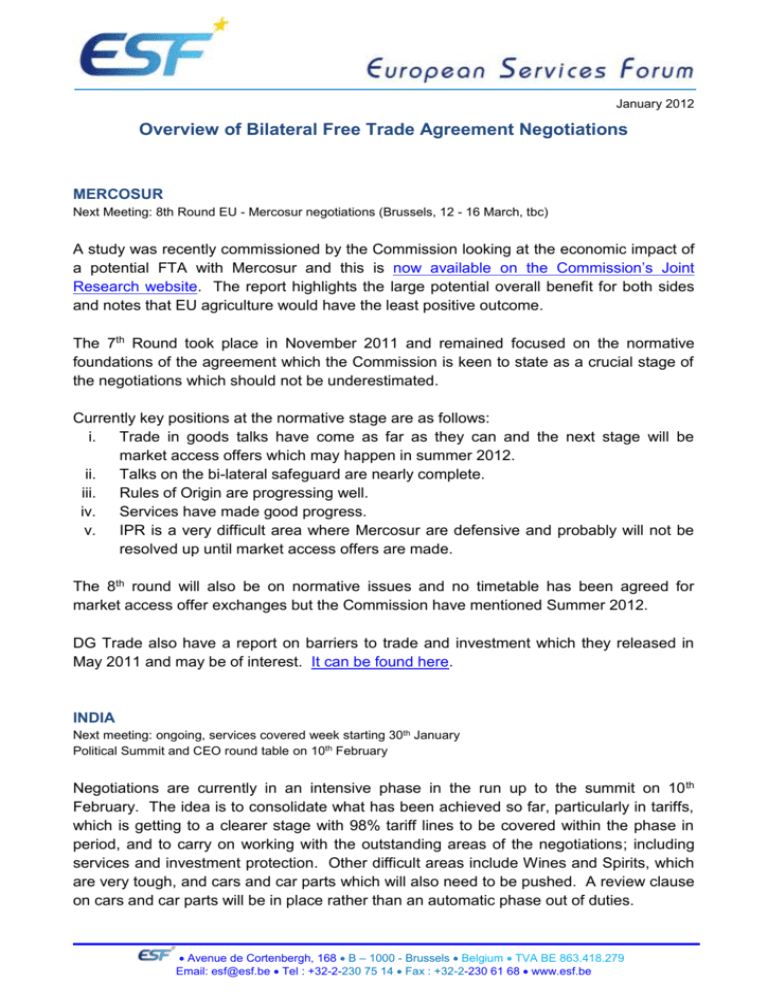
January 2012 Overview of Bilateral Free Trade Agreement Negotiations MERCOSUR Next Meeting: 8th Round EU - Mercosur negotiations (Brussels, 12 - 16 March, tbc) A study was recently commissioned by the Commission looking at the economic impact of a potential FTA with Mercosur and this is now available on the Commission’s Joint Research website. The report highlights the large potential overall benefit for both sides and notes that EU agriculture would have the least positive outcome. The 7th Round took place in November 2011 and remained focused on the normative foundations of the agreement which the Commission is keen to state as a crucial stage of the negotiations which should not be underestimated. Currently key positions at the normative stage are as follows: i. Trade in goods talks have come as far as they can and the next stage will be market access offers which may happen in summer 2012. ii. Talks on the bi-lateral safeguard are nearly complete. iii. Rules of Origin are progressing well. iv. Services have made good progress. v. IPR is a very difficult area where Mercosur are defensive and probably will not be resolved up until market access offers are made. The 8th round will also be on normative issues and no timetable has been agreed for market access offer exchanges but the Commission have mentioned Summer 2012. DG Trade also have a report on barriers to trade and investment which they released in May 2011 and may be of interest. It can be found here. INDIA Next meeting: ongoing, services covered week starting 30th January Political Summit and CEO round table on 10th February Negotiations are currently in an intensive phase in the run up to the summit on 10 th February. The idea is to consolidate what has been achieved so far, particularly in tariffs, which is getting to a clearer stage with 98% tariff lines to be covered within the phase in period, and to carry on working with the outstanding areas of the negotiations; including services and investment protection. Other difficult areas include Wines and Spirits, which are very tough, and cars and car parts which will also need to be pushed. A review clause on cars and car parts will be in place rather than an automatic phase out of duties. Avenue de Cortenbergh, 168 B – 1000 - Brussels Belgium TVA BE 863.418.279 Email: esf@esf.be Tel : +32-2-230 75 14 Fax : +32-2-230 61 68 www.esf.be The services negotiations remain difficult as many sectors require domestic Indian reforms/decisions that have been slow in coming, particularly Banking, Legal, and multibrand retail issues are unlikely to be solved before the summit. The Commission is hoping that the summit will present an opportunity to push on key areas. For the Indians it is clear that their priorities are in modes 1 and 4. In Public Procurement progress has been made, and there is a hope to consolidate by summit (clarify the parameters) but it will probably not be finalised by the summit. On the week of the 30th January a meeting will take place at Director General level and the Commission will continue to meet to cover outstanding issue. A meeting will take place on services at the beginning of February and negotiations on investment protection will start as well. CANADA Next meeting: EU-Canada CETA working session (Ottawa, 30 January - 3 February) Following meeting: EU-Canada CETA inter-session meetings (Brussels, 19 - 23 March, tbc) The last full round was held in October; currently there is a more informal format with the last meeting taking place in December. Good progress was made (almost closing chapter on mutual recognition), with the next working session scheduled for February in Ottawa. Service and investment are progressing rapidly. There are some issue with the EU’s Mode 4 offerings with some EU countries concerned about precedents being set; though the Commission feels these are overblown and resolvable. Financial services issues are finally moving forward. Investment protection is still in the stage of information exchange, no real negotiations yet. This is an internal EU issue, but it does seem as though the EU is moving towards a common position. Investment protection will need to be part of the core agreement as it is important to the Canadians. In other areas of the negotiations Rules of Origin is a very difficult chapter as both economies employ different systems. In regards to the IP chapter, Canada is open for discussion despite heavy pressure from the US to join the anti-GI front. There has been less movement in the area of patent rules due to heavy pressure from the Canadian generics industry and provinces worried about spiralling healthcare cost. Copyright is progressing due to a new Canadian bill, it is however not up to all EU expectations. Avenue de Cortenbergh, 168 B – 1000 - Brussels Belgium TVA BE 863.418.279 Email: esf@esf.be Tel : +32-2-230 75 14 Fax : +32-2-230 61 68 www.esf.be SINGAPORE Next meeting: 10th round EU-Singapore FTA negotiations (Singapore, 27 February - 1 March) The 9th round of EU-Singapore negotiations took place in Singapore between the 16th and 20th January. Unfortunately concluding the agreement has not been as easy as many had foreseen, though there are hopes this can be achieved in summer 2012. Focus now is on GIs, NTBs, financial services and public procurement but political intervention may be required to resolve the sticking points. In services the Singaporeans are forcefully holding out on providing the EU with parity on what they have given to the US in financial services. MALAYSIA Next meeting: 6th round of EU-Malaysia FTA negotiations (7 - 10 February, Kuala Lumpur) Following meeting: 7th round of EU-Malaysia FTA negotiations (Brussels, 17 - 20 April) A ministerial meeting took place in December and it has been reaffirmed that the Commission is attributing special significance to this agreements in order to set a good precedent for future similar agreements in the region on the horizon. Currently there is a complex environment in Malaysia due to elections on the horizon which must take place before spring 2013 and are currently hanging over the negotiations. Furthermore, Malaysia risks losing its GSP status in 2014, although this does not seem to be an issue for them currently in the negotiations. There are also many religious and ethnically linked barriers in Malaysia which ranging from Halal restrictions to indigenous participation requirements. In addition 60% of GDP is linked to State Owned Enterprises (SOEs). The government acknowledges the need for reform, but it makes the negotiations more difficult. In services the EU has given a calibrated offer after the Malaysians tabled a very disappointing offer with poor mode 3 thresholds. Malaysia is interested in goods (palm oil, fish …); with the rest being of lower importance. Progress has been made in Rules of Origin but accumulation has not yet been discussed. Export duties are on the red-line for Malaysia with a “review in 10 years” being offered. In Public Procurement Malaysia gave a non-offer with thresholds 10-20x higher than the EU. In IPR and GI some issues have arisen but not big ones, mainly competition with TPP. On data protection Malaysia is currently reflecting. In terms of the impact of the TPP there are mixed results. In some areas it helps pressure Malaysia in a positive direction and in some it is in conflict. Nevertheless, Malaysia is having to align its position as they are aware that the EU and US communicate. Commission remains hopeful to conclude by the end of 2012. Avenue de Cortenbergh, 168 B – 1000 - Brussels Belgium TVA BE 863.418.279 Email: esf@esf.be Tel : +32-2-230 75 14 Fax : +32-2-230 61 68 www.esf.be OTHER ASEAN There will be an ASEAN minister meeting on the 1st April and the EU will be the only 3rd party present. This will be linked to the Business Summit. The TPP is progressing with the roadmap from Honolulu, similar to EU scoping papers, next round of negotiations in March. TPP will have an impact on EU relations with the region. Vietnam Most advanced Getting more flexible Maybe some breakthrough in April Finalising scoping thereafter Indonesia Want a Comprehensive Economic Partnership Agreement (CEPA) rather than an FTA for internal reasons. They will come back in May once they have ‘socialised’ the idea of an agreement. Philippines Very interested now in re-launching the scoping exercise but nothing concrete yet Not the top ASEAN priority Thailand Elections have created a new dynamism Simmering but nothing concrete as yet Discussing the scoping Other Cambodia is pushing for regional agreement Brunei is knocking on the doors but no progress on PCA Myanmar policy is currently under review due to recent changes there COMMONWEALTH OF INDEPENDENT STATES + RELATED Moldova meetings: DCFTA - Technical preparatory meeting (Chisinau, 18 January) 1st round EU-Moldova DCFTA negotiations (Chisinau, 19 - 23 March, tbc) Georgia meetings: DCFTA - Technical preparatory meeting (Tiblisi, 31 January) 1st round EU-Georiga DCFTA negotiations (Tiblisi, 26 - 30 March, tbc) A consultation on Georgia, Moldova and Kazakhstan should be ready by the end of January with a 2 month deadline attached. While trade flows with Georgia and Moldova Avenue de Cortenbergh, 168 B – 1000 - Brussels Belgium TVA BE 863.418.279 Email: esf@esf.be Tel : +32-2-230 75 14 Fax : +32-2-230 61 68 www.esf.be are not large i.e. < 0.2% (each) of EU trade, the Commission has stressed that they are keen to get feedback from the private sector. Ukraine On the 22nd December 2011 the EU completed technical negotiations with Ukraine and the Chief negotiators have signed to freeze the texts. There will be a ‘scrubbing’ exercise now to get the +/-1200 pages cleaned up and it is expected this will be achieved by June. The Commission are please with the text (which ESF is working on getting access to) and see it as a good neighbourhood DC-FTA template. Currently political complications concerning the fate of the former Ukrainian PM mean that no initialling will take place until a resolution has been found. Some member states are taking a very strong position on this issue and Business has also been advised to be careful on pushing in Ukraine unless in private and at a very high level. Moldova Preparatory meetings have got under way as of mid January and there is a good political drive behind them. As with Ukraine the EU is looking to spread European governance through the trade related aquis with a DC-FTA. Georgia Preparatory meetings get underway at the end of January. This is expected to be a simpler process, relatively speaking, as Georgia is trying to move closer towards EU legislation in its legal texts. The negotiations are expected to move quite quickly as a result with the Commission putting estimates of 1-1.5 years down as an approximate timescale. The Commission has already been working with them on moving closer towards EU legislation. MEDITERRANEAN In December 2011 the Council gave authorisation for DC-FTAs to be opened with Egypt, Jordan, Morocco and Tunisia. Ukraine is to be the template, but the Med countries are very different from the Eastern Partnership and naturally every negotiation has its idiosyncrasies. In terms of projected timetables, talks Morocco and Tunisia should start in mid February, Jordan by the end of February and Egypt only once a new government is in place. It is expected that scoping exercises with Tunisia and Morocco should be quick and can be concluded by this summer. Consultations for the 4 agreements should be available from the end of February. Trade in services has already been discussed with the four countries as a mandate to start services negotiations had already been given. Good progress has been made here in discussions with Morocco (launched in June 2011) that are further advanced than expected and there are hopes it can be concluded by summer 2012. The results from this Avenue de Cortenbergh, 168 B – 1000 - Brussels Belgium TVA BE 863.418.279 Email: esf@esf.be Tel : +32-2-230 75 14 Fax : +32-2-230 61 68 www.esf.be will feed into the DC-FTA with Morocco. With the remaining three, services talks have progressed less far and will therefore be taken up within the broader DC-FTA negotiations. Investment protection has been included in the mandates and will form part of the agreements. Public Procurement is expected to be a big issue because it is not included in the current Association Agreements and will require wholesale reform to take the EU model. Tunisia has given signals of reform but it will be a difficult process. Customs, competition and trade facilitation will be in the agreement, as will IP and GI, which will follow the Ukraine template. Sustainable Development is set to be important for the European Parliament. In general Egypt and Jordan are expected to be more difficult agreements to make with the main issues revolving around getting them to accept the EU Aquis while in the process of domestic change. Furthermore, the EU does not have much market access to offer as leverage. In terms of interests, services will be a good addition to the agreements but their priorities will primarily be in mode 4, which has caused problems with Egypt in the past. The Commission has made it clear that regional integration for Med countries is a primary objective, however it is also felt that taking on the EU model as a component of economic governance will aid the integration amongst themselves. The Commission have also voiced some concern with Egypt as it is the most open country in the region and it would be negative to see them back track, although for the time being the right signals are being sent. GCC (SAUDI ARABIA) A visit is planned by Commissioner De Gucht in February for political discussions. Export duties have been the sticking point in the GCC negotiations in the past, though the Commission thinks there are other issues as well that are holding things up and will try to further develop things at the visit. JAPAN The Commission is currently negotiating the text of the scoping exercise with further discussions taking place in Brussels in mid to late January. There is not much new to report at this stage. The Commission has advised caution over the realism of Japanese press reports on finalising the scoping exercise; March will be a crunch time. The main EU topics are on NTB’s and public procurement. For Japan the main question is about the form and duty reduction and less on the framework. In general, Japan is somewhat more flexible on NTB discussions than a few months ago. Avenue de Cortenbergh, 168 B – 1000 - Brussels Belgium TVA BE 863.418.279 Email: esf@esf.be Tel : +32-2-230 75 14 Fax : +32-2-230 61 68 www.esf.be The Commission believes that it is unlikely that Japan would join the TPP (if they do at all) until after the TPP has been concluded. UNITED STATES Working Group 1st meeting: Washington 22nd & 23rd February The establishment of the High-Level Working Group on Jobs and Growth late last year willl focus on the following 5 elements: Conventional barriers to trade in goods, such as tariffs and tariff-rate quotas; Reduction, elimination, or prevention of barriers to trade in goods, services, and investment; Opportunities for enhancing the compatibility of regulations and standards; Reduction, elimination, or prevention of unnecessary “behind the border” non-tariff barriers to trade in all categories; Enhanced cooperation for the development of rules and principles on global issues of common concern and also for the achievement of shared economic goals relating to third countries. Upon completing its analysis, the Working Group will consider and recommend the practical means necessary to implement any policy measures identified. It will provide an interim update to Leaders on the status of its work in June 2012 and produce a final report with findings, conclusions, and recommendations to leaders by the end of 2012. The lead personnel involved in the working group are: Co-Chairs: EU Trade Commissioner Karel De Gucht & US Trade Representative Ron Kirk Co-Chief Negotiators: Director General DG Trade Jean Luc Demarty & Deputy USTR Myriam Zapiro High Officials Co-Chairs: Director “Neighbouring countries, USA and Canada” , DG Trade, Ignacio Garcia-Bercero & Assistant USTR for Europe, Dan Mullaney Five sub working groups have now been set up for: Trade in Goods, Regulation on Trade in Goods, Services and Investment, IPR and Public Procurement, All Other Issues. Throughout the process the Commission will be looking at the feasibility of an agreement and its potential impact on the on-going FTAs and WTO. The possible defensive issues will also be analysed to ensure a complete assessment of the possible benefits and costs of any transatlantic initiative. The so-called 21st century issues will also be studied by the Working Group (State Owned Enterprises - SOE, local requirements, cross border data flows as well as the issue of secure trade and cyber security. The Commission has warned all to be realistic about a calendar for any future initiative which would need first to finalise the work of the HLWG, then finalise an official “scoping exercise” that would deliver a negotiating mandate to negotiate. Following this there would Avenue de Cortenbergh, 168 B – 1000 - Brussels Belgium TVA BE 863.418.279 Email: esf@esf.be Tel : +32-2-230 75 14 Fax : +32-2-230 61 68 www.esf.be be inevitable political crises and difficulties which if overcome would then lead to conclusion, legal scrubbing, translation and finally ratification and implementation. Avenue de Cortenbergh, 168 B – 1000 - Brussels Belgium TVA BE 863.418.279 Email: esf@esf.be Tel : +32-2-230 75 14 Fax : +32-2-230 61 68 www.esf.be
